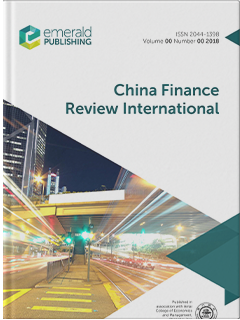中美股市对经济和贸易政策不确定性的对冲作用:来自近期动荡的教训
IF 7.6
1区 经济学
Q1 BUSINESS, FINANCE
引用次数: 4
摘要
目的分析经贸政策的不确定性对中美股市的影响。此外,本研究还考察了美国和中国股市在应对美国和中国经济和贸易政策不确定性时的对冲和避险特性。设计/方法论/方法为了实现预期目标,作者通过Glosten等人采用了动态条件相关性。(1993)基于广义自回归条件异方差(DCC-GJR-GARCH(1,1))和分位数交叉谱(QS)模型的模型。该研究使用了2010年3月至2022年6月的月度观察结果。研究结果表明,美国和中国之间的经济和贸易政策不确定性极其敏感,分别对DJChina88和DJUS具有高波动性集群效应。相反,鉴于中国经济和贸易政策的不确定性,美国股市指数既显示了这一时期的对冲特性,也显示了新冠肺炎和俄罗斯-乌克兰危机期间的避险特性。相比之下,在中国股市中,只有深圳和上海股指可能对美国经济和贸易政策的不确定性提供强有力的对冲和避险资产;然而,DJShenzhen(DJChina88)股票在对抗中国贸易政策不确定性(CTPU)(中国经济政策不确定性[CEPU])时表现出较弱的对冲和避险资产(对冲收益)。原创/价值该研究通过在最近的新冠肺炎和俄罗斯入侵乌克兰期间提供新的证据,扩展了有关股市表现的文献,以涵盖经济和贸易政策的不确定性。本文章由计算机程序翻译,如有差异,请以英文原文为准。
The hedging role of US and Chinese stock markets against economic and trade policy uncertainty: lessons from recent turbulences
PurposeThis study analyses the impact of economic and trade policy uncertainty on US and Chinese stock markets. Also, this study examines the hedge and safe-haven properties of US and China stocks against both US and Chinese economic and trade policy uncertainty.Design/methodology/approachTo achieve the desired goals, the authors employ Dynamic Conditional Correlation through Glosten et al. (1993) model based on the Generalized Autoregressive Conditional Heteroscedasticity (DCC-GJR-GARCH (1, 1)) and Quantile cross-spectral (QS) models. The study uses monthly observations spanning from March 2010 to June 2022.FindingsThis study evidence that the economic and trade policy uncertainty between USA and China is extremely sensitive and has high volatility clustering effects on DJChina88 and DJUS, respectively. Conversely, against the Chinese economic and trade policy uncertainty, the US stock market indexes show both hedging properties across the period and safe-haven during COVID-19 and Russia–Ukraine crises. In contrast, among the Chinese stock markets, only DJShenzhen and DJShanghai stock indices might provide strong hedging and safe-haven properties against the US economic and trade policy uncertainties; however, DJShenzhen (DJChina88) stock shows weak hedge and safe-haven properties (hedging benefits) against Chinese trade policy uncertainty (CTPU) (Chinese economic policy uncertainty [CEPU]).Practical implicationsThe findings have significant implications for investors, portfolio managers and regulators in hedging and making proper decisions under uncertain circumstances.Originality/valueThe study extends the literature on stock market performance to cover the economic and trade policy uncertainty by providing novel evidence during the recent COVID-19 and Russia–Ukraine invasion.
求助全文
通过发布文献求助,成功后即可免费获取论文全文。
去求助
来源期刊

China Finance Review International
BUSINESS, FINANCE-
CiteScore
12.40
自引率
1.20%
发文量
112
期刊介绍:
China Finance Review International publishes original and high-quality theoretical and empirical articles focusing on financial and economic issues arising from China's reform, opening-up, economic development, and system transformation. The journal serves as a platform for exchange between Chinese finance scholars and international financial economists, covering a wide range of topics including monetary policy, banking, international trade and finance, corporate finance, asset pricing, market microstructure, corporate governance, incentive studies, fiscal policy, public management, and state-owned enterprise reform.
 求助内容:
求助内容: 应助结果提醒方式:
应助结果提醒方式:


